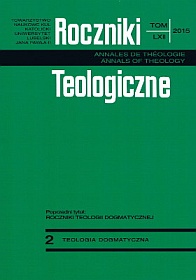The Blind Nature of the Designer? Modern Attempts at Explaining the Pluralism of the Forms of Life
Abstract
This article is an attempt to present modern scientific theories talking about the creation of plural forms of life on Earth. Moreover, this paper presents theological evaluation of these theories. This piece of working presents following theories of evolution: Darwinism and neo-Darwinism; concept of stasis; Evolutionary Development; and Intelligent Design. The additional goal of this article is to exhibit that at the current stage of research anthropogenesis any conception of the origin of man is proved without doubts. This paper shows also arguments why many modern theories of evolution cannot be approved from the theological point of view.
References
Behe M., Darwin's Black Box: The Biochemical Challenge to Evolution, New York 1996.
Behe M., Irreducible Complexity: Obstacle to Darwinian Evolution, w: Debating Design: From Darwin to DNA, red. M. Ruse, W. Dembski, Cambridge 2004, s.352-370.
Bylica P., Naturalizm metodologiczny jako warunek naukowości w kontekście relacji nauki i religii, „Przegląd Filozoficzny – Nowa Seria” 13(2004), nr 3(51), s. 163-175.
Chaberek M., Kościół a ewolucja, Siedlce 2012.
Coyne J.A., God in the details, „Nature” 1996, vol. 383.
Darwin K., O powstawaniu gatunków drogą doboru naturalnego czyli o utrzymaniu się doskonalszych ras w walce o byt [On the Origin of Species by means of natural selection, or the preservation of favoured races in the struggle for life], tł. Sz. Dickstein i J. Nusbaum, Warszawa 2001.
Dembski W., The Design Inference: Eliminating Chance through Small Probabilities, Nottingham 2004.
Dembski W., The Design Revolution: Answering the Toughest Questions about Intelligent Design, InterVarsity Press 2004.
Doolitle R.F., A delicate balance, „Boston Review”, luty/marzec 1997.
Eldregde N., Gould S.J., Punctuated equilibria: an alternative to phyletic gradualism, w: Models in Paleobiology, red. T.J.M. Schopf, San Francisco 1972, s. 82-115.
Eldredge N., The Triumph of Evolution, New York 2000.
Flew A., Habermas G.R., My Pilgrimage from Atheism to Theism, w: Philosophia Christi, Winter 2005.
Forrest B., Gross P., Creationism's Trojan Horse: The Wedge of Intelligent Design, Oxford 2004.
Gauger A., Axe D., The Evolutionary Accessibility of New Enzyme Functions, „Bio-complexity” (1)2011, s. 1-17.
Giertych M., Papież o ewolucji, „Opoka w kraju”, 20(41)1996, grudzień.
Gould S.J., The Structure of Evolutionary Theory. The Belknap Press of Harvard University Press, Cambridge−Massachusetts−London 2002.
Hilbert M., Darwinowskie podziały. Papież, kardynał, jezuita i ewoluująca debata nad pochodzeniem, w: Filozoficzne Aspekty Genezy – 2005/2006, t. 2/3.
Hoffman A., Wokół ewolucji, Warszawa 1997.
Hoyle F., Wickramasinghe Ch., Evolution from Space. A Theory Cosmic Creationism, Simon & Schuster 1984.
JanPaweł II, Przemówienie do członków Papieskiej Akademii Nauk z 22 października 1996. Tekst polski w: „L'Osservatore Romano” (1)1997, s. 18-19.
Kosche M., Koncepcje stworzenia człowieka u początku XXI wieku, RTD 5(60)2013, s. 191-204.
Luskin C., Teoria inteligentnego projektu nie wypowiada religijnych twierdzeń o sferze nadnaturalnej, tł. I. Janus, w: Filozoficzne Aspekty Genezy – 2009/2010, t. 6/7.
Miller K.R., Finding Darwin's God: A Scientist's Search for Common Ground Between God and Evolution, New York 1999.
Muller G.B., Newman S.A., Origination of Organismal Form: Beyond the Gene in Developmental and Evolutionary Biology, Cambridge 2003.
Najder J., Teoria przerwanej równowagi – główne założenia i pojęcia, w: Filozoficzne Aspekty Genezy – 2009/2010, t. 6/7.
Orr H.A., Darwin v. intelligent design (again), „Boston Review”, grudzień/styczeń 1996/1997.
Perakh M., Unintelligent Design, New York 2004.
Poe H.L., Mytyk C.R., Od metody naukowej do naturalizmu metodologicznego. Ewolucja idei, w: Filozoficzne Aspekty Genezy – 2011, t. 8.
Sagan D., Kardynał Schönborn a stanowisko Kościoła katolickiego wobec sporu kreacjonizmu z ewolucjonizmem, „Filozofia Nauki” 14(2006), nr 1(53).
Shanks N., God, the Devil, and Darwin: A Critique of Intelligent Design Theory, Oxford 2004.
Schönborn C., Finding Design in Nature, „The New York Times”, 7-July-2005.
Thaxton, A New Design Argument, w: Cosmic Pursuit, 1 March 1998, http:/www.discovery.org/a/137. Polskie tł.: I. Janus, w: Filozoficzne Aspekty Genezy – 2011, t. 8, s. 155, http://www.nauka-a-religia.uz.zgora.pl/index.php?action=tekst&id=207 [data dostępu: 12-08-2014].
Woodward T., Darwin Strikes Back: Defending the Science of Intelligent Design, Michigan 2006, s. 135-152.
Yonekura K., Maki S., Morgan D.G. i in., The Bacterial Flagellar Cap as the Rotary Promoter of Flagellin Self-Assembly, „Science” 2000, vol. 290.
Copyright (c) 2015 Roczniki Teologiczne

This work is licensed under a Creative Commons Attribution-NonCommercial-NoDerivatives 4.0 International License.





